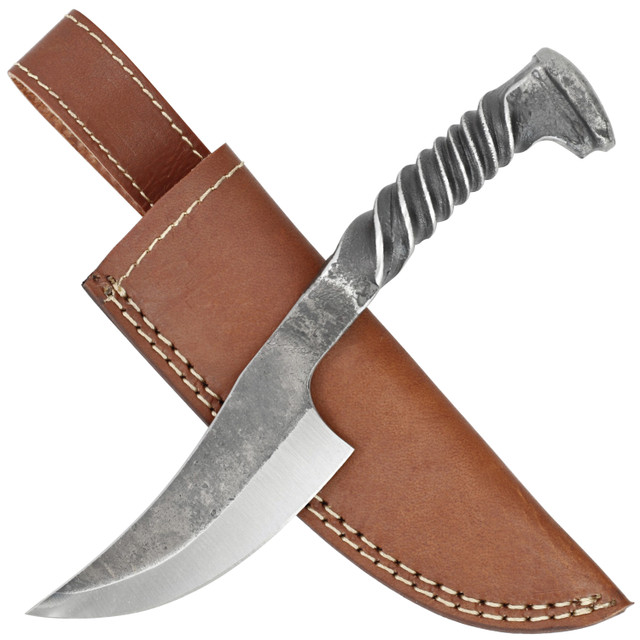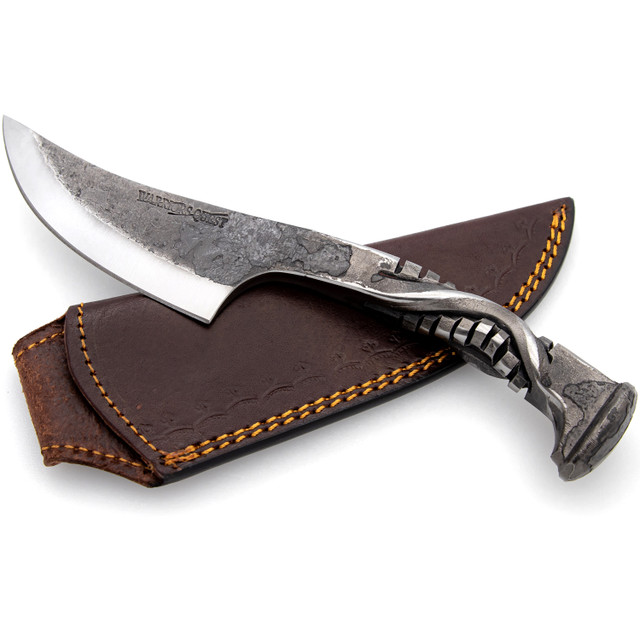Hand Forged Knives vs. Machine-Made Knives
Posted by SwordsSwords on Aug 20th 2025
When it comes to selecting the right knife, the debate between hand forged knives and machine-made knives is a significant one. Both types of knives have their unique advantages and drawbacks, and understanding these differences can help you make an informed decision. In this blog, we'll explore the key aspects of craftsmanship, performance, and longevity, comparing hand forged knives to their machine-made counterparts.
Craftsmanship: The Art of Forging by Hand
Hand forged knives are the product of a time-honored tradition that dates back centuries. The process of hand forging involves heating the metal and repeatedly hammering it to shape the blade. This method allows artisans to control the blade’s thickness, weight, and balance meticulously, resulting in a knife that is not only functional but also a work of art. Each hand forged knife is unique, with subtle variations that reflect the craftsmanship and care that went into its creation.
One of the most revered types of hand forged knives is the hand forged Japanese knife. Japanese blacksmiths are known for their precision and attention to detail, producing blades that are incredibly sharp and well-balanced. The traditional techniques used in making hand forged Japanese knives have been passed down through generations, ensuring that each knife is a masterpiece in its own right.
The artistry involved in making hand forged knives extends beyond mere functionality. The folding and hammering process creates a distinctive pattern on the blade, often referred to as the knife's “grain.” This unique pattern adds aesthetic value to the knife, making it a prized possession for collectors and culinary enthusiasts alike.

Machine-Made Knives: Efficiency and Precision
In contrast, machine-made knives are mass-produced using automated processes. These knives are manufactured to precise specifications, ensuring uniformity across every product. The efficiency of machine production allows for quicker manufacturing times, which generally makes machine-made knives more affordable than their hand-forged counterparts. This affordability makes them accessible to a broader audience, including those who need a reliable knife for daily tasks without paying a premium price.
The precision of machine-made knives is one of their key selling points. Since these knives are produced in large quantities using computer-controlled machinery, they offer consistent performance across all units. This uniformity is particularly beneficial in professional settings where identical knives are needed for tasks requiring consistent results, such as in large-scale food preparation.
However, what machine-made knives gain in precision, they often lose in character. Unlike hand forged knives, which carry the mark of the artisan who made them, machine-made knives are devoid of any personal touch. They are functional, yes, but they lack the unique qualities that make hand forged knives so special.
Performance: The Battle of Sharpness and Durability
When evaluating the performance of hand forged knives versus machine-made knives, several factors come into play. Hand forged knives are often praised for their superior edge retention. The repeated heating and hammering during the forging process create a denser and more durable blade, which can hold a sharp edge for an extended period. This makes hand forged knives especially useful for tasks that require precision, such as slicing, dicing, and carving.
A hand forged carving knife, for example, can provide cleaner, more accurate cuts compared to its machine-made counterpart. The density of the blade also makes it more resistant to chipping and breaking, which is particularly important when the knife is subjected to heavy use.
Machine-made knives, while not as individualized, can still offer excellent performance, especially when made from high-quality materials. Advanced manufacturing techniques have made it possible to produce machine-made knives with impressive sharpness and durability. However, these knives may require more frequent sharpening and maintenance compared to hand forged knives, particularly when used for demanding tasks.

Longevity: Which Knife Stands the Test of Time?
Longevity is another critical factor when comparing hand forged knives to machine-made knives. Due to the labor-intensive forging process, hand forged knives tend to be more durable and can last for generations if properly maintained. The dense steel of a hand forged knife is less prone to rust, chipping, and wear, making it a long-term investment for those who value quality and craftsmanship.
Machine-made knives, while durable, may not offer the same longevity. Over time, the materials and construction of machine-made knives might show signs of wear, especially if they are used frequently or for heavy-duty tasks. While high-quality machine-made knives can certainly last for many years, they may not have the same enduring strength as hand forged knives.
Conclusion:
In the end, the choice between hand forged knives and machine-made knives depends on your needs and preferences. If you value craftsmanship, unique design, and long-lasting performance, hand forged knives are likely the better choice. The artistry and precision of a hand forged Japanese knife or a hand forged carving knife can elevate your experience, whether in the kitchen or the great outdoors.
For those who need a reliable, affordable knife for everyday tasks, a machine-made knife might be the more practical option. These knives offer consistency, precision, and efficiency, making them suitable for a wide range of uses.
Understanding the differences between hand forged knives and machine-made knives ensures that you select the best tool for your specific needs. For those who appreciate tradition, quality, and durability, the best hand forged knives are more than just tools—they are heirlooms to be treasured for generations. For a wide selection of high-quality hand forged knives, visit swordsswords.com and find the perfect knife that suits your needs.

